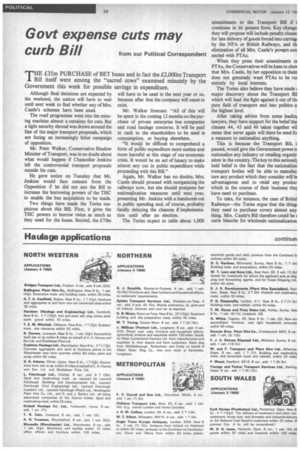Govt expense cuts may
Page 40

If you've noticed an error in this article please click here to report it so we can fix it.
curb Bill from our Political Correspondent THE £35m PURCHASE of BET buses and in fact the £2,000m Transport Bill itself were among the "sacred cows" examined minutely by the Government this week for possible savings in expenditure.
Although final decisions are expected by the weekend, the nation will have to wait until next week to find whether any of Mrs. Castle's schemes have been axed.
The road programme went into the mincing machine almost a certainty for cuts. But a tight security shroud was drawn around the fate of the major transport proposals, which are facing an increasingly bitter campaign of opposition.
Mr. Peter Walker, Conservative Shadow Minister of Transport, was in no doubt about what would happen if Chancellor Jenkins left the controversial transport proposals outside his cuts.
He gave notice on Tuesday that Mr. Jenkins would face censure from the Opposition if he did not axe the Bill to increase the borrowing powers of the THC to enable the bus acquisition to be made.
Two things have made the Tories suspicious about this Bill. First, it gives the THC powers to borrow twice as much as they need for the buses. Second, the £.70m will have to be used in the next year or so, because after that the company will cease to exist.
Mr. Walker forecast: "All of this will be spent in the coming 12 months on the purchase of private enterprise bus companies and road haulage concerns. It will be paid in cash to the shareholders to be used in consumption, or buying elsewhere.
"It would be difficult to comprehend a form of public expenditure more useless and more harmful at this stage of our economic crisis. It would be an act of lunacy to make almost any cut in public expenditure while proceeding with this Bill."
Again, Mr. Walker has no doubts. Mrs. Castle should proceed with reorganizing the railways now, but she should postpone her nationalization measures until next year, presenting Mr. Jenkins with a handsome cut in public spending and, of course, probably fatally delaying the chances if implementation until after an election.
The Tories expect to table about 1,000 amendments to the Transport Bill if i continues in its present form. Key change they will propose will include penalty clause for late delivery of goods forced into carriagi by the NFA or British Railways, and thi elimination of all Mrs. Castle's powers con nected with PTAs.
When they press their amendments ot PTAs, the Conservatives will be keen to shop that Mrs. Castle, by her opposition to them does not genuinely want PTAs to be rw entirely by local interests.
The Tories also believe they have made major discovery about the Transport Bil which will lead the fight against it out of th4 pure field of transport and into politics a the highest level.
After taking advice from some leadini lawyers, they have support for the belief tha clauses 44, 45 and 46 taken together wil mean that never again will there be need fol a measure to nationalize anything.
This is because the Transport Bill, i passed, would give the Government power tc nationalize any industry or retailing organiz ation in the country. The key to this serious13 held belief is the fact that the nationalize( transport bodies will be able to manufac. ture any product which they consider will bt advantageous and to retail any producl which in the course of their business the3 have need to purchase.
To take, for instance, the case of Britisi Railways-the Tories argue that the thing they need to purchase covers almost any thing. Mrs. Castle's Bill therefore could be z carte blanche for wholesale nationalization
















































































































